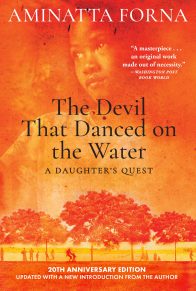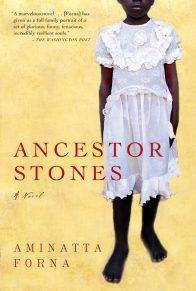“Haunting . . . Detail builds upon detail until the dread and violence that have been barely restrained burst into the open.” —Anthony Domestico, San Francisco Chronicle
“Absorbing and disturbing . . . Forna’s unwavering gaze compels a close look at the complexities of our shared histories. . . . The questions she asks—What is the price of memory? How do we bear the burden of forgetting?—demand attention.” —Ellah Allfrey, NPR
“A masterful novel by a gifted writer lays bare the secrets and scars of past conflicts . . . [Forna] reveals her story at a pace of measured suspense until it reads like a slow-burn thriller. Her prose quietly grips us by the throat and then tightens its hold. It is storytelling at its most taut.” —Arifa Akbar, The Independent (UK)
“If . . . The Memory of Love, set in Africa, confirmed Forna’s flair for writing about war and its aftermath, The Hired Man seals her reputation as arguably the best writer of fiction in this field. . . . This is a novel to be passed on judiciously, like a special gift.” —Jackie Annesley, London Evening Standard
“[Forna] has a terrific ability to evoke the poisonous atmosphere of culpability and denial from which civil conflicts emerge. . . . [and] the atmosphere of festering tension in which perpetrators of the most grotesque acts of violence continue to live side by side. . . . The Hired Man triumphantly proves that the story need not always remain the same.” —Alfred Hickling, The Guardian (UK)
“Forna . . . has created a convincing narrator in Duro. . . . His voice is one of the novel’s key pleasures—unpretentious and perceptive, tolerant, brooding and sometimes surprising. . . . Every sentence shimmers with possible depths. . . . The plotting is subtle, the suspense maddening, the set-ups undetectable, the character work masterful—and Forna’s surprises go off like time bombs. This is literature with a punch.” —Nick DiMartino, Shelf Awareness
“A satisfying novel of truth and forgetting . . . quietly gripping . . . Duro’s matter-of-fact narration adds to the unease, defying the reader to separate benign local color from hints about unspeakable acts.” —Adrian Turpin, Financial Times (UK)
“A persuasive tale of silent secrets. Dark and troubling . . . it is a story of slow, incremental animosities that find full expression once war descends on the village. . . . Forna’s storytelling is beautifully paced, chilly and brooding in tone, and powerfully gripping. . . . A low-key but sophisticated portrait of history–and evil–at a local level.” —Kirkus Reviews (starred review)
“For fans of Monica Ali and Kiran Desai’s writing . . . Perhaps [Forna’s] finest literary effort yet. . . . Forna’s light–and, at times, darkly comedic–touch buoys even the heaviest of subjects.” —Harper’s Bazaar (UK)
“Beautifully precise style . . . An ingenious examination of the kind of ghosts that those with no experience of civil war are unable to see.” —Frances Perraudin, The Observer (UK)
“Moving . . . Forna does an exquisite job of contrasting her leads’ perspectives. . . . This is a powerful exploration of the impact that violence has on those who suffer it and those who inflict it.” —Publishers Weekly (Pick of the Week)
“A story that initially seduces with intense and vivid physical detail, low, sour wit and a suggestion of romance, before twisting—without the reader even fully registering—it into a knotty, powerfully ambiguous allegory for collective trauma and negotiation with historical pain. . . . [The] book also lends a salty, Hemingway-esque enjoyment to its evocations of deadly adventure. . . . A sharp, pertinent, absorbing story told by a writer of extreme gifts. . . . Forna is brilliant.” —Hannah McGill, The Scotsman (UK)
“Absorbing . . . [Forna] subtly illuminat[es] the prolonged aftereffects of all wars. . . . Forna’s decision to write from the perspective of a Croatian man is risky, but Duro is exceedingly convincing: melancholy, not maudlin; stoical, not hard-boiled.” —Kenneth Champeon, Book Page
“Forna writes sensitively about the power of a history that is both terrible and banal. . . . Duro’s voice carries the narrative with a solidity and complexity that is very satisfying.” —Helen Dunmore, The Times (London)
“Set in Croatia, this mesmerizing novel examines the aftermath of war and genocide. . . . What’s most interesting about this story is its portrayal of how those who survive atrocities must learn how to continue to live together. . . . Highly recommended and likely to find appreciation among fans of Khaled Hosseini’s The Kite Runner, another tale of friendship and betrayal.” —Evelyn Beck, Library Journal (starred review)
“Aminatta Forna is one of those rare writers who can create stillness and silence on the page. . . . Tentatively, fragment by fragment, the present is peeled back to expose the wounds of the past. Each revelation, however great, seems intimate on this small stage and Forna modulates the growing suspense with exquisite skill. . . . Forna wisely resists explaining the war in this region once known as the Serbian Republic of Krajina. Rather she conveys its ghastly texture and rhythms, how it feels. Yet this tightly compressed novel, crisscrossed by scars, is above all beautiful, reminiscent in its mesmerizing clarity of William Trevor’s fiction or Per Petterson’s.” —Anna Mundow, Barnes&Noble Review
“The way ethnic conflict can force apart a community like water creeping through brickwork is something [Forna] understands well.” —Claire Allfree, Metro (London)
“Powerful . . . The first few chapters are picturesque, even comic at times. . . . But the real story is ticking beneath. . . . The pacing of this novel is stunning. After an edgy beginning, it blooms into joyousness halfway through when the mosaic is restored, and then the cruelty begins to flow. . . . But in the end, The Hired Man is not a simple story of revenge. It is subtler and harder; it is about the power of not exacting revenge.” —Joy Lo Dico, The Independent (UK)
“Set in and around a small Croatian village, Forna’s accomplished and intricate novel explores the effects of war and the endurance and significance of memory. . . . As the house’s restoration becomes entwined with Duro’s recollections of his past, Forna leads readers to the gradual, raw revelation of a town devastated by war and haunted by the aftermath.” —Leah Strauss, Booklist
“Aminatta Forna uses [the dual present/past narrative] here with terrific skill and insight.” —Harry Ritchie, Daily Mail (UK)
“Fans of The English Patient will love this haunting, memorable book.” —Red (UK)
“Forna quietly roots her readers in the context of the novel, reminding us of the underlying tension between the past and present that has been weighing on the citizens of the community. The subtle power of her style, with instances of lyrical prose followed by simple, definitive phrases . . . allows the reader to get lost in the moment before returning us to reality. . . . With its myriad hard and soft edges, The Hired Man is a joy to read, suspenseful on occasion and beautiful in many.” —Lara Southern, Bustle
“Her latest fiction deals with what has become her habitual subject–the dance of envy and joy, cruelty and kindness, betrayal and loyalty, to the accompaniment of civil war—but also stakes out fresh ground. . . . Hints of Gost’s past emerge, and the optimism of [Duro’s] account of careful restoration is skillfully and sickeningly undermined by a growing apprehension of evil, which is all the more frightening for being approached obliquely, and remaining largely mysterious.” —Lewis Jones, The Daily Telegraph (UK) [4/5 stars]
“By the end of The Hired Man, Aminatta Forna has made it clear that she knows many ways to tell a story. . . . Compelling. . . . [an] excellent novel.” —Jennifer Vega, Popmatters
“Subtle . . . Aminatta Forna [is] a specialist in the aftermath of conflict. . . . Combining a contemporary domestic drama with a tragic tale of recent war, The Hired Man is artfully constructed. . . . Behind the simple Duro there stands a sophisticated author, whose novel is all the more powerful for not being overexplicit.” —David Grylls, The Sunday Times (UK)
“Artful, subtle and powerful.” —The Sunday Times (Ireland)
“Deeply felt and coolly self-contained . . . It is a testament to Forna’s talent that she inverts the usual process here: shaping fiction to work for history’s sake; obliging musical lies to sing the unbelievable truth.” —Geordie Williamson, The Australian (Australia)
“Deeply moving . . .The symbolism of The Hired Man is incredibly powerful.” —Read Outside the Box















